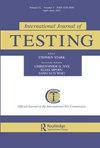多语言背景下的总结性评估:比较判断揭示了文学中不同语言之间的可比性
IF 1.4
Q2 SOCIAL SCIENCES, INTERDISCIPLINARY
引用次数: 0
摘要
摘要多语言总结性评估由于多语言提供和可比性之间存在的紧张关系而面临重大挑战。然而,用于调查多语言评估可比性的传统方法无法适应包含针对复杂结构的扩展响应的评估。本文讨论了一项研究,探讨了双语考官是否可以在不同语言(英语和西班牙语)的文学论文对中应用比较判断(CJ)。初步研究结果表明,虽然跨语言标准化有一定的好处,但当不同语言群体对目标结构的处理方式不同时,双语CJ面临效度挑战。当多语言学科共享基本结构但在学术方法上不同时,现有的学科间和学科内可比性定义是不够的。因此,建议采用学科内可比性的总体分类,以围绕这种性质的多语言评估进行讨论。最后,建议对双语CJ进行进一步研究,以确定该方法如何最有效地支持多语言评估可比性的调查。本文章由计算机程序翻译,如有差异,请以英文原文为准。
Summative assessments in a multilingual context: What comparative judgment reveals about comparability across different languages in Literature
Abstract Multilingual summative assessments face significant challenges due to tensions that exist between multiple language provision and comparability. Yet, conventional approaches for investigating comparability in multilingual assessments fail to accommodate assessments that comprise extended responses that target complex constructs. This article discusses a study that investigated whether bilingual examiners could apply comparative judgment (CJ) to pairs of Literature essays across different languages (English and Spanish). Preliminary findings suggest that whilst there are some cross-language standardization benefits, bilingual CJ faces validity challenges when different language cohorts approach target constructs differently. Existing definitions of inter-subject and intra-subject comparability are insufficient when multilingual subjects share fundamental constructs but differ in academic approaches. It is therefore proposed that an overarching classification of intra-disciplinary comparability be introduced to frame discussions around multilingual assessments of this nature. Finally, it is recommended that further research into bilingual CJ be carried out to determine how the method can most effectively support investigations into multilingual assessment comparability.
求助全文
通过发布文献求助,成功后即可免费获取论文全文。
去求助
来源期刊

International Journal of Testing
SOCIAL SCIENCES, INTERDISCIPLINARY-
CiteScore
3.60
自引率
11.80%
发文量
13
 求助内容:
求助内容: 应助结果提醒方式:
应助结果提醒方式:


